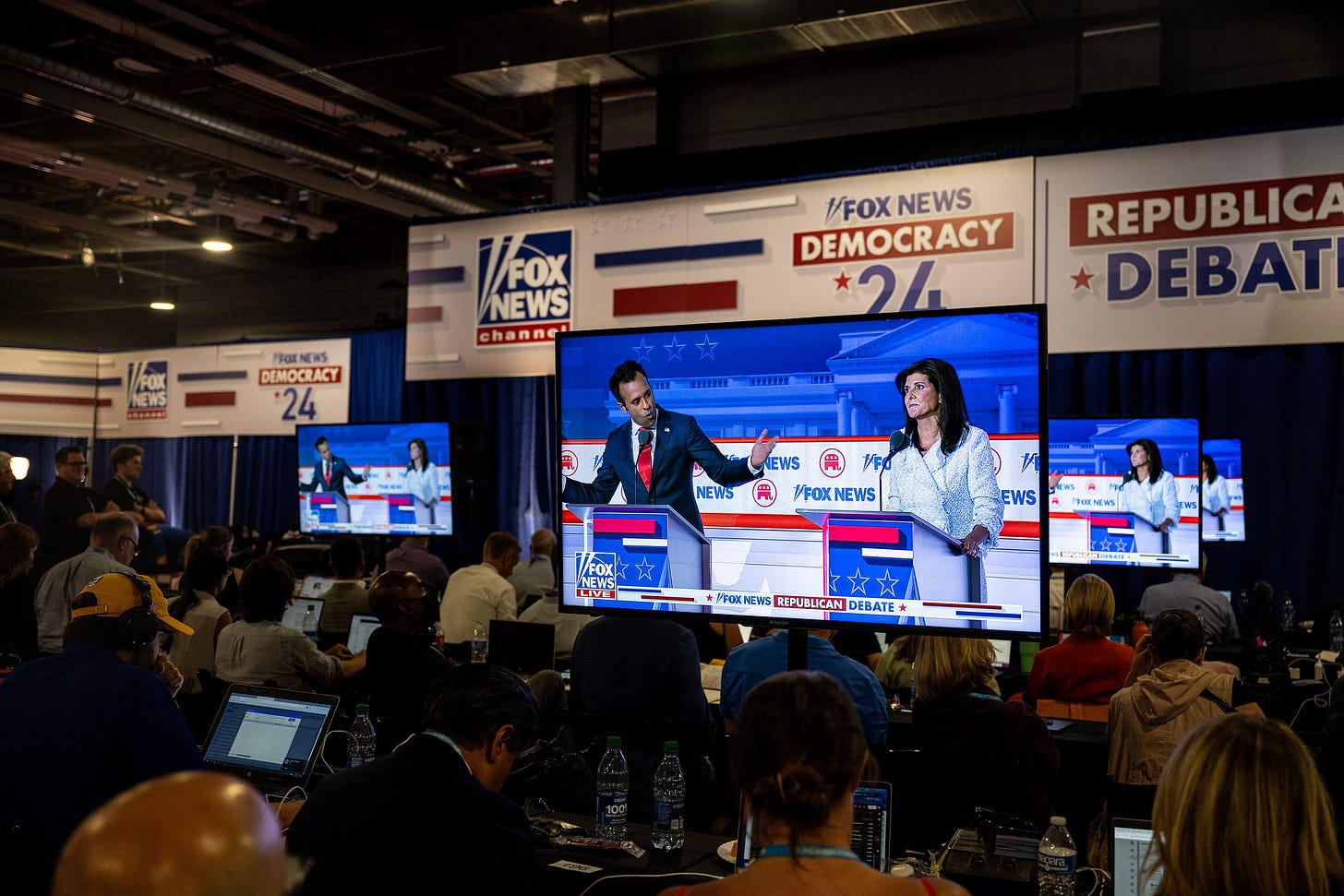The Coming Republican Showdown over Israel
The “America First” camp is coming closer to butting heads with the party’s pro-Israel consensus.

The idea of cutting all aid to Israel has made it to a U.S. presidential debate. It was, to many people’s surprise, a Republican primary debate. Dark horse populist candidate Vivek Ramaswamy had said a few days earlier that, if more Arab countries normalize ties with Israel, then U.S. aid would no longer be necessary. At the Wednesday debate, neoconservative hawk Nikki Haley attacked him for this position, thundering that, “it’s not that Israel needs America, it’s that America needs Israel. They’re on the frontline of defense to Iran.” Ramaswamy responded that Israel, whose social and political model he loves, should be able to stand on its own two feet.
Ramaswamy’s relatively tame argument for cutting aid to Israel is the tip of a very large iceberg in Republican politics. According to polls, the younger generation of Republicans and especially Evangelical Christians are turning against Israel in ways that don’t show in national politics yet. A few months ago, leaked text messages showed Republican influencer Pedro Gonzalez complaining about “ZioCons” (Zionist conservatives) and Israelis trying to “define the rules of American nationalism.” Further to the right, Trump-adjacent influencer Nick Fuentes has been making explicitly antisemitic arguments against Israel for years.
There is a tension between the moralistic pro-Israel attitude of the Republican establishment and the “America First” attitude of the grassroots nationalist right. It’s increasingly difficult to smooth over as Republican voters turn against aid to Ukraine. After all, how can all foreign aid be a “globalist” money suck except for aid to one rich country in the Middle East? The tension is also tied to a broader conflict over right-wing identity. The pro-Israel camp tends to identify with neoconservative War on Terror politics, which the nationalists see as a terrible mistake pushed by special interests.
The explosion of those tensions could make Democratic debates on Israel look tame by comparison. Democrats argue over who balances the human rights of Israelis and Palestinians better. Republicans are not so bound by liberal decorum. Accusations of antisemitism (let alone Islamophobia) are not as much of a career-ender on the right. The pro- and anti-aid factions in the Republican Party can take much sharper positions: that Israel is a bulwark against a dangerous Muslim horde, or that Israel is preventing Americans from looking out for their own national interests. The Palestinian issue may not even enter the equation.
In other ways, however, any Republican crack-up over Israel will look a lot like the Democratic version. The party will not suddenly go anti-Israel as a whole, but could lose its unquestioned pro-Israel consensus. Younger populists like Ramaswamy may say taboo things about Israel, whether on purpose or by accident. The party establishment may also accuse candidates with unconventional foreign policy views of wanting to sell Israel down the river. (Haley’s attack on Ramaswamy was a preview of that line.) If either scenario comes to pass, Israel will become a proxy for pro- and anti-establishment foreign policy views within the Republican Party, just as it has been for Democrats.
The best hope for Israel and its supporters is to quietly deter anti-Israel sentiments. The Gonzalez leaks suggest that many younger Republicans resent Israel’s status within the party, yet do not think the debate is worth having in public. However, the over-the-top nature of the pro-Israel position itself makes it harder to keep the debate quiet. Neoconservative hawks really believe, as Haley said, that America needs Israel more than Israel needs America. That level of pro-Israel fervor within the Republican establishment will only draw more attention to the issue. Indeed, even mainstream pro-Trump journalists like Matt Walsh attacked Haley’s statement as “the very definition of America Last.”
Aid and diplomatic support against Palestine are only a small part of Israel’s demands on U.S. policy. Haley and Ramaswamy both agreed that the United States should work with Israel against Iran, and try to expand the Abraham Accords, Israel’s network of alliances with Arab states. So far, these appear to be cost-free positions. However, Saudi Arabia is asking for guarantees of U.S. military protection in order to join the Abraham Accords, and Israel has long demanded a U.S. military strike on the Iranian nuclear program. If and when the prospect of sending Americans to kill and die becomes more real, figures like Ramaswamy will find it harder to sidestep the question of support for Israel.


